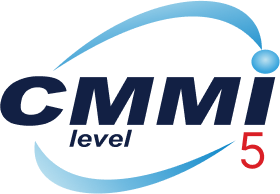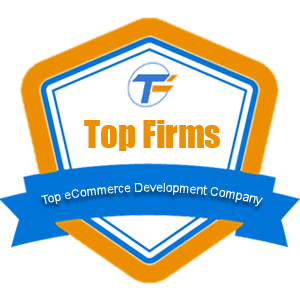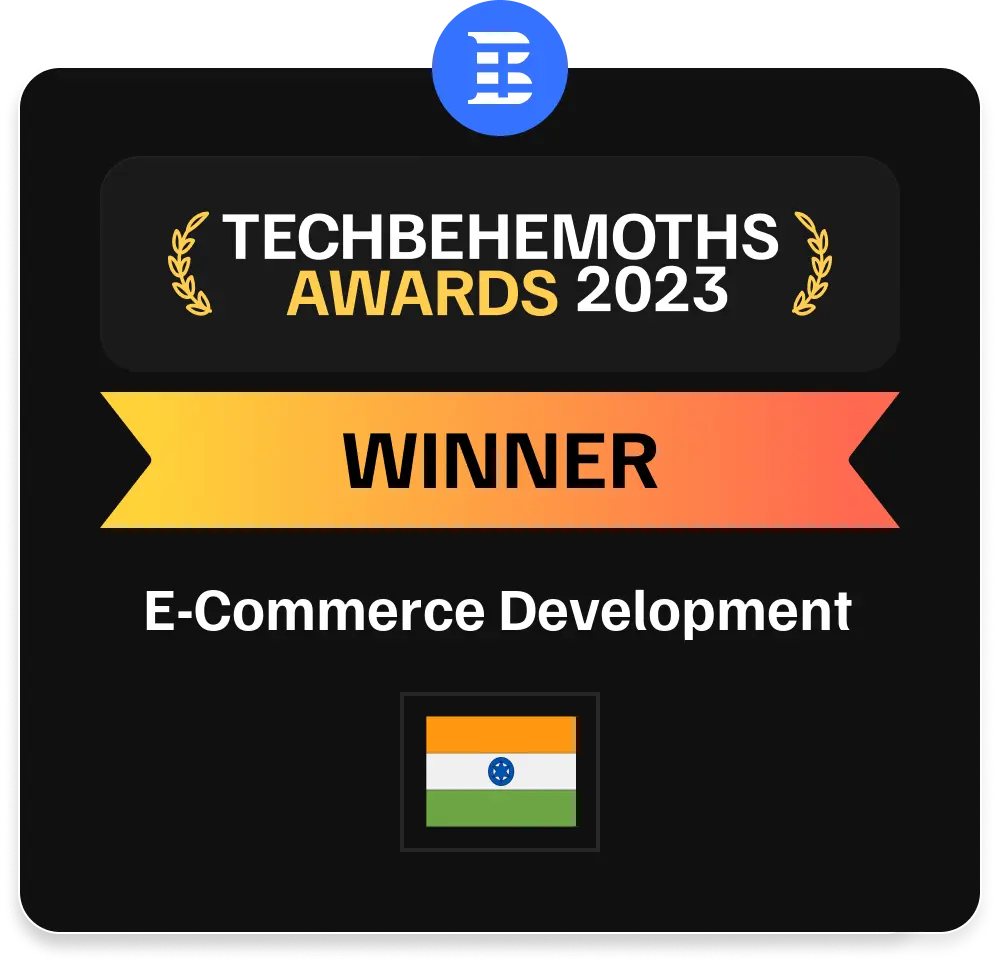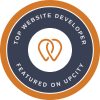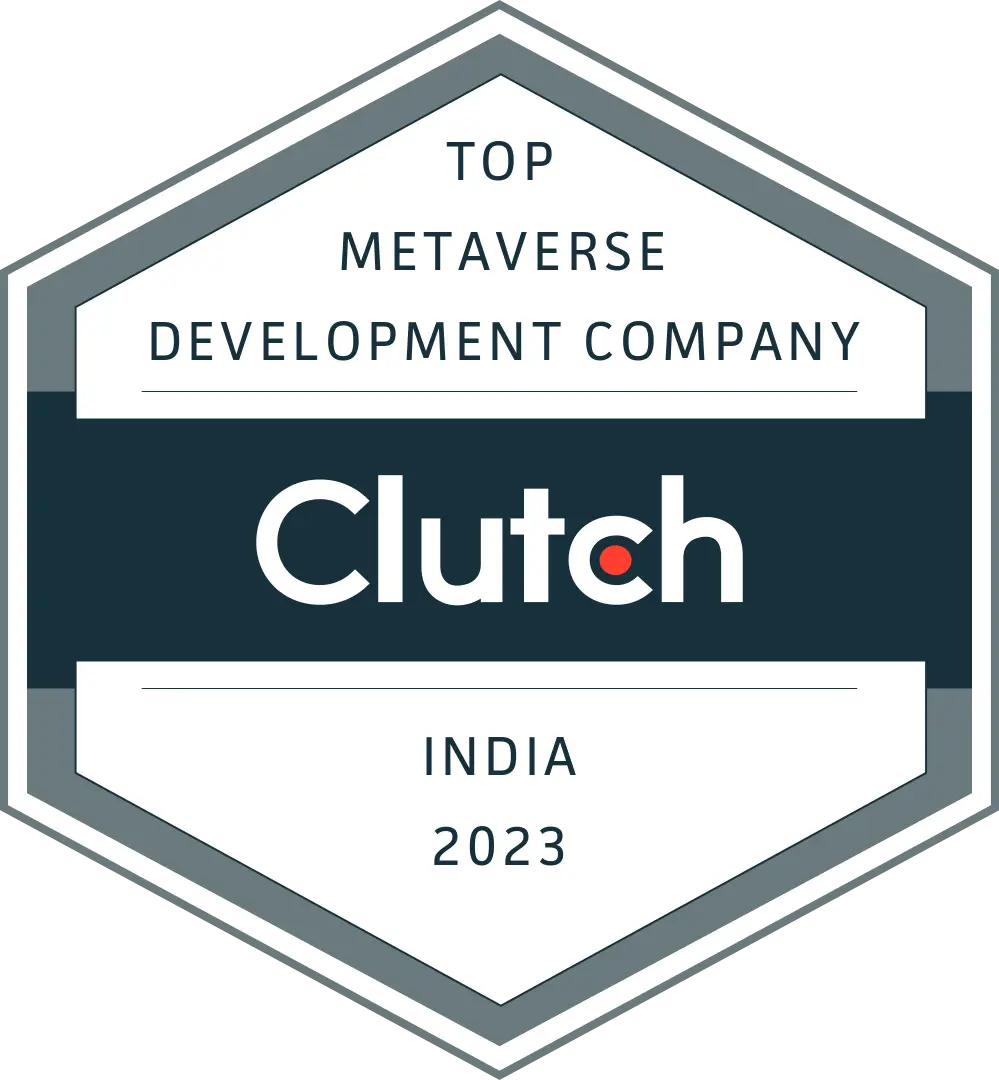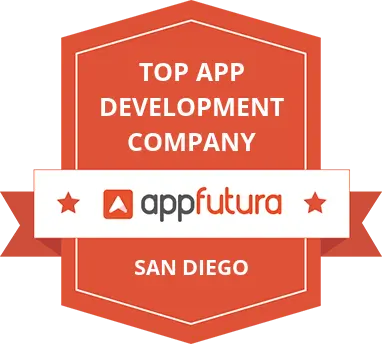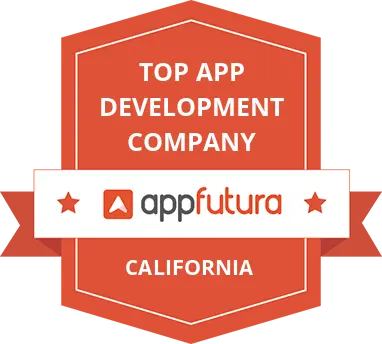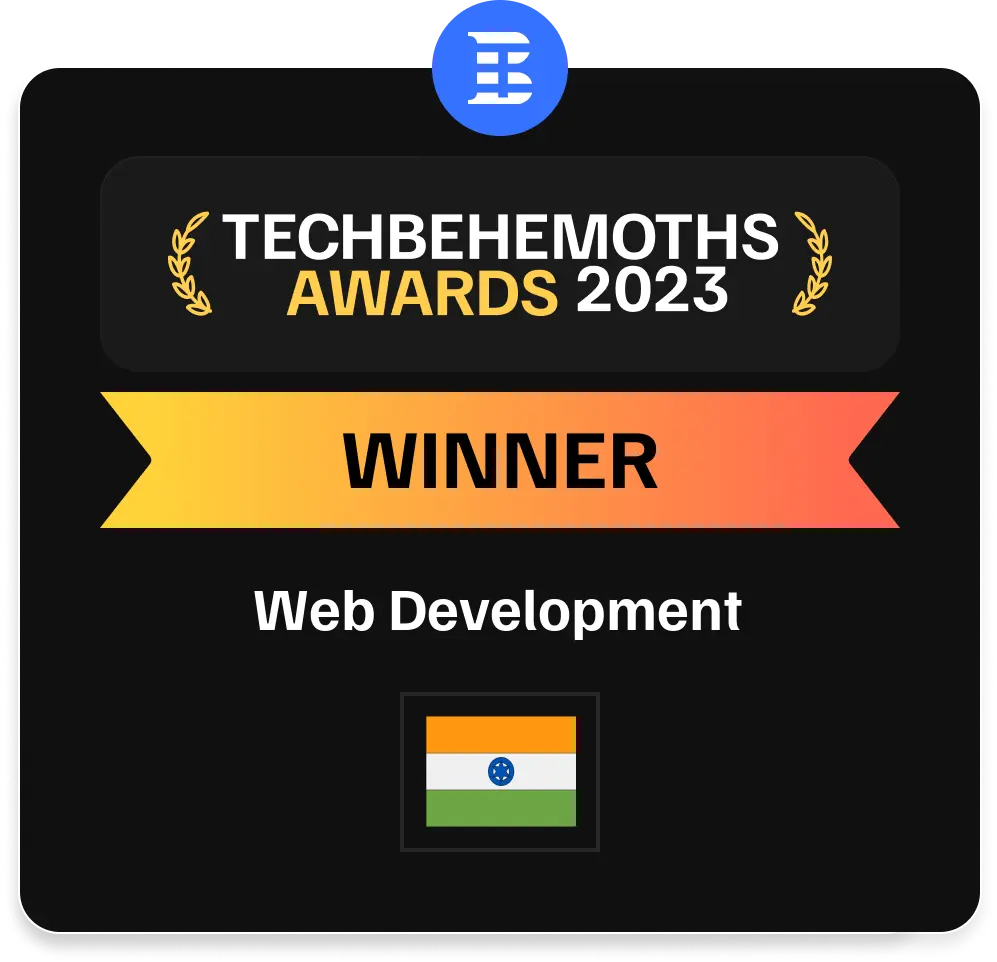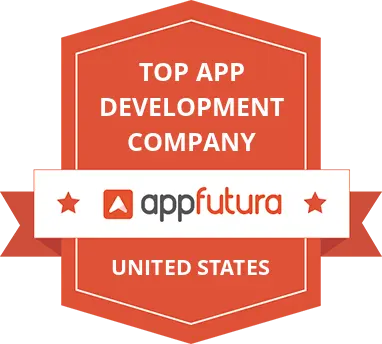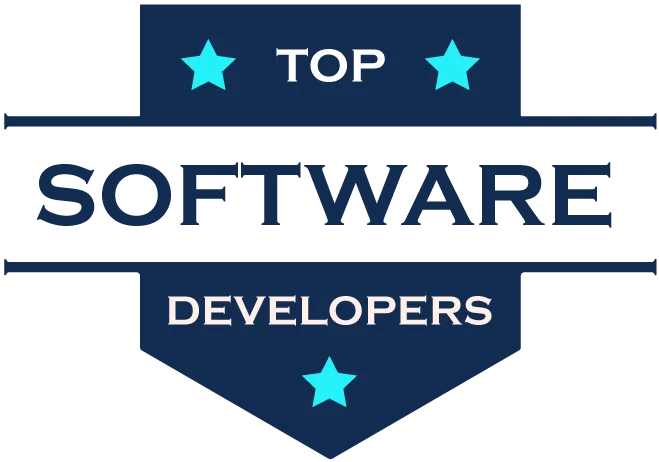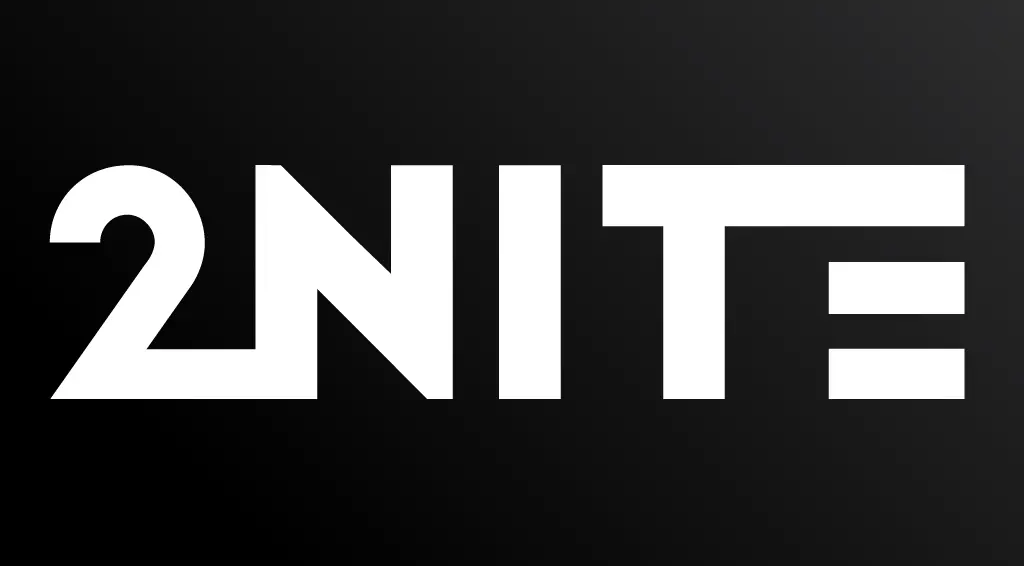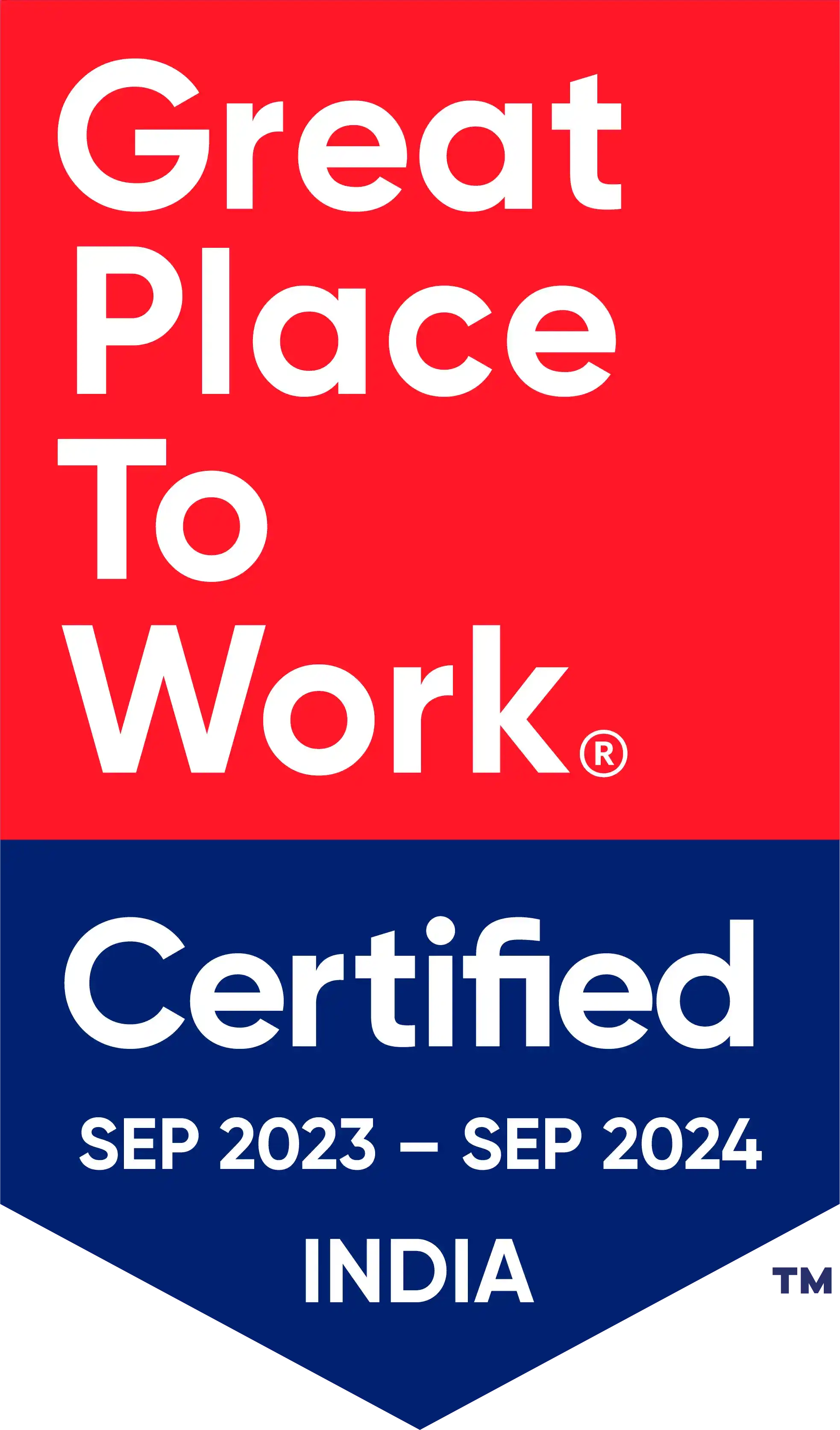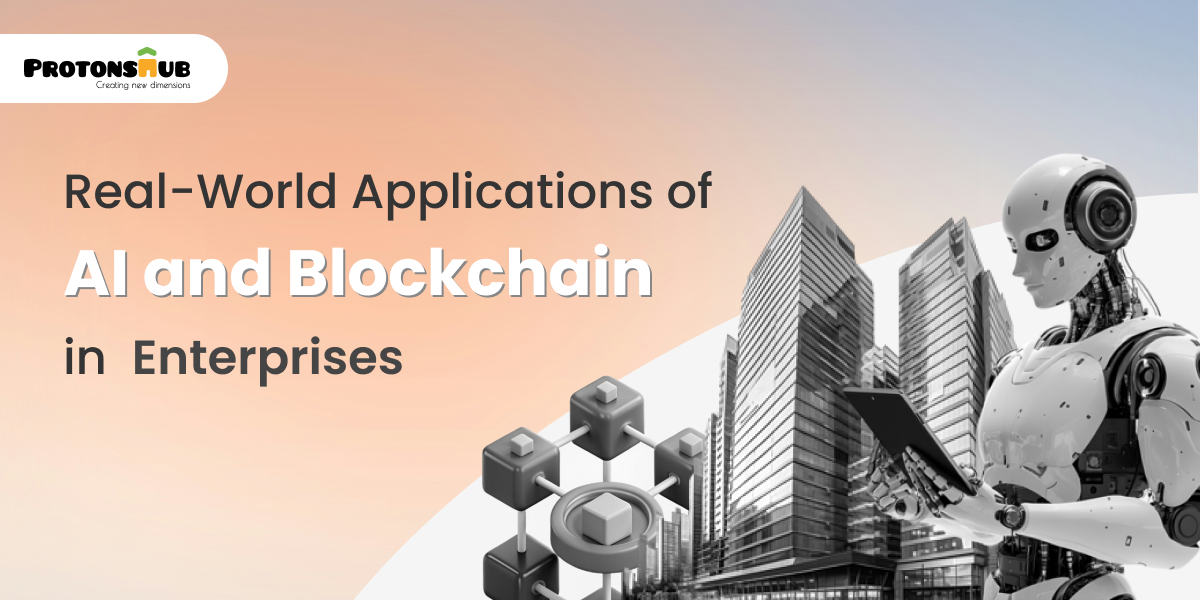Introduction
Artificial intelligence (AI) and blockchain are two of the most transformative technologies reshaping modern enterprises. AI drives automation, predictive insights, and intelligent decision-making, while blockchain provides transparency, reliability, and tamper-proof data and transactions.
Individually, both technologies are powerful. But when combined, they create systems that are not only intelligent but also inherently trustworthy. Enterprises are now moving beyond pilot projects and applying AI + blockchain in real-world scenarios across finance, healthcare, supply chain, energy, and cybersecurity.
In this blog, we’ll cover everything about AI and Blockchain in Enterprises:
- Why AI and Blockchain Work Better Together
- Real-World Applications of AI and Blockchain Across Industries
- Key Benefits of AI and Blockchain Integration for Enterprises
- Common Challenges in Enterprise Adoption of AI and Blockchain
- Strategies to Overcome AI and Blockchain Challenges
- The Future of AI and Blockchain in Enterprises
We’ll explore practical applications, the benefits of integration, challenges to consider, and how enterprises can work with the right technology partners to capture value.
Why AI and Blockchain Work Better Together
AI thrives on data—it learns from it, makes predictions, and automates tasks. Blockchain guarantees that the data powering AI remains secure, unaltered, and easily verifiable. This synergy reduces risks while enhancing reliability.
- AI contributes: pattern recognition, intelligent automation, natural language processing, anomaly detection, and real-time decision-making.
- Blockchain contributes: decentralized trust, immutability, transparency, and secure audit trails.
Together, enterprises get trustworthy intelligence—AI for insights and blockchain for guaranteed data integrity.
AI and Blockchain in Action Across Industries
AI and blockchain are not just buzzwords anymore; they are shaping how enterprises operate, compete, and deliver value. When combined, these technologies go beyond theory and deliver practical, measurable outcomes across industries. From detecting fraud in finance to securing patient data in healthcare and making supply chains more transparent, AI and blockchain are helping businesses tackle long-standing challenges while unlocking new opportunities.
Let’s look at how enterprises are applying this powerful duo in the real world.
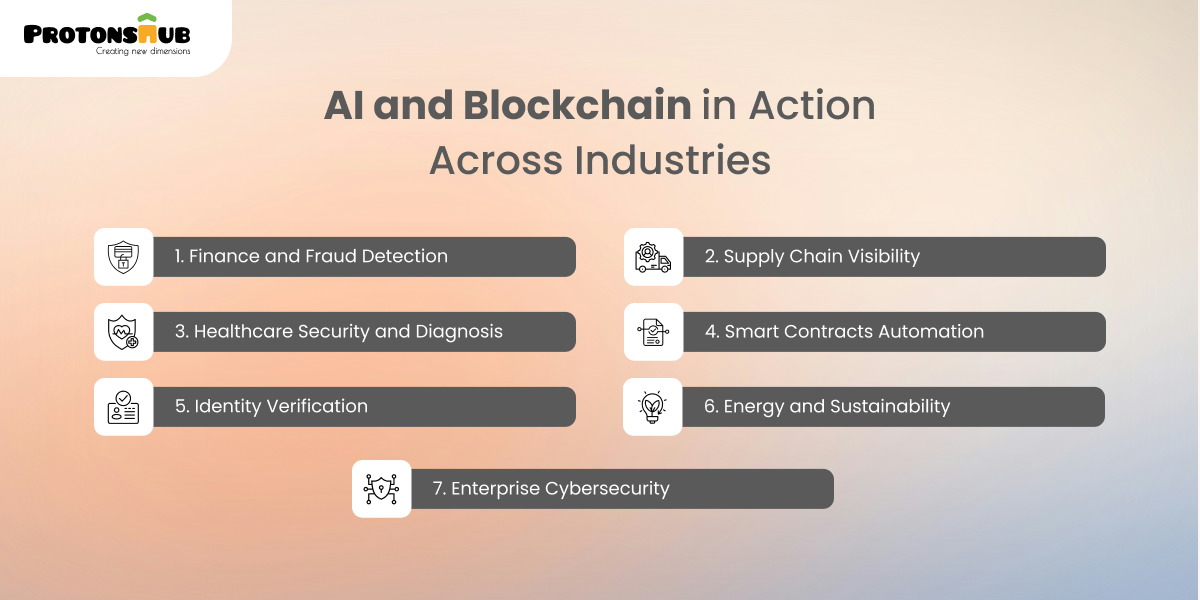
1. Finance and Fraud Detection
Fraud in banking and financial services costs enterprises billions every year. Traditional fraud detection systems rely on centralized databases that can be manipulated or lack real-time detection capabilities.
AI enhances fraud detection by continuously scanning transactions for anomalies—such as unusual spending patterns, location mismatches, or sudden spikes in activity. Machine learning models get smarter over time, making them more effective at predicting fraud before it happens.
Blockchain complements this by storing all transactions in an immutable ledger. Once an entry is made, it cannot be altered or deleted, making it highly reliable for auditing and regulatory compliance.
Example: AI-driven fraud detection with blockchain-backed ledgers is helping global banks detect risks in real time while ensuring regulators can verify transaction integrity.
2. Supply Chain Visibility
Supply chains are global, complex, and often opaque. Enterprises struggle with counterfeit products, inefficiencies, and lack of real-time visibility.
AI improves supply chains by forecasting demand, predicting shipment delays, and optimizing delivery routes. For example, predictive algorithms can alert businesses to potential raw material shortages or port delays before they impact operations.
Blockchain, on the other hand, provides a transparent record of every transaction—from raw material sourcing to final delivery. This means all stakeholders, including suppliers, manufacturers, and consumers, can track the exact journey of goods.
Example: Walmart uses blockchain for food safety tracking, while AI predicts supply chain delays, giving customers confidence in product safety and delivery timelines.
3. Healthcare Security and Diagnosis
AI plays a crucial role in predictive diagnosis—helping doctors identify diseases at an early stage using medical imaging, genetic data, and patient histories. It also supports drug discovery by analyzing large datasets to predict how patients might respond to new treatments.
Blockchain secures this sensitive data by storing it in a decentralized, tamper-proof system. Hospitals can ensure that only authorized professionals access medical records, which improves patient privacy and regulatory compliance.
Example: Hospitals are using AI for early cancer detection and storing verified results on blockchain systems, ensuring accuracy while protecting patient privacy.
4. Smart Contracts Automation
Conventional contracts are prone to delays, disagreements, and high intermediary costs. Blockchain-powered smart contracts resolve this by automatically carrying out agreements once the specified conditions are fulfilled.
When AI is added, these contracts become more intelligent. AI can analyze external inputs such as IoT sensor data, weather forecasts, or market trends before triggering outcomes. Blockchain makes sure these results are documented with full transparency and remain tamper-proof.
Example: In insurance, AI verifies accident data, and blockchain executes automatic claim settlements, saving time and ensuring fairness for both insurers and customers.
5. Identity Verification
Identity fraud and cyberattacks are growing threats in the digital-first world. Enterprises need ways to verify customers securely while keeping the onboarding process seamless.
AI strengthens verification by analyzing biometric data such as facial recognition, fingerprint scans, or voice authentication.
Blockchain takes this further by storing identity information on decentralized ledgers that cannot be forged or tampered with. Unlike traditional systems, no single party controls the data, making it less vulnerable to breaches.
Example: Fintech firms now use AI-powered biometrics with blockchain-backed IDs, reducing onboarding times and boosting trust in digital services.
6. Energy and Sustainability
Enterprises worldwide are under pressure to optimize energy use and prove their commitment to sustainability.
AI helps by predicting energy demand, identifying inefficiencies, and suggesting optimization strategies. For example, manufacturers can apply AI to track machine performance and minimize excess energy usage.
Blockchain ensures transparency by validating energy transactions and certifying carbon credits. It also enables peer-to-peer energy trading, where businesses and individuals can buy and sell renewable energy directly.
Example: Renewable energy companies forecast usage with AI and use blockchain to issue verifiable green energy certificates, boosting trust in eco-friendly initiatives.
7. Enterprise Cybersecurity
Cyber threats are more advanced than ever, and centralized defense systems often fail against sophisticated attackers.
AI strengthens cybersecurity by detecting anomalies in network behavior, identifying zero-day vulnerabilities, and automating responses to potential attacks.
Blockchain adds another layer by recording security logs in an immutable ledger. If a breach occurs, enterprises can trace back the exact sequence of events, ensuring accountability and preventing attackers from covering their tracks.
Example: Enterprises deploy AI-driven monitoring with blockchain-secured logs to build self-defending systems capable of real-time attack detection and response.
Benefits of AI and Blockchain Integration for Enterprises
The combined use of AI and blockchain is not just about innovation—it creates measurable advantages that directly impact enterprise growth and resilience.
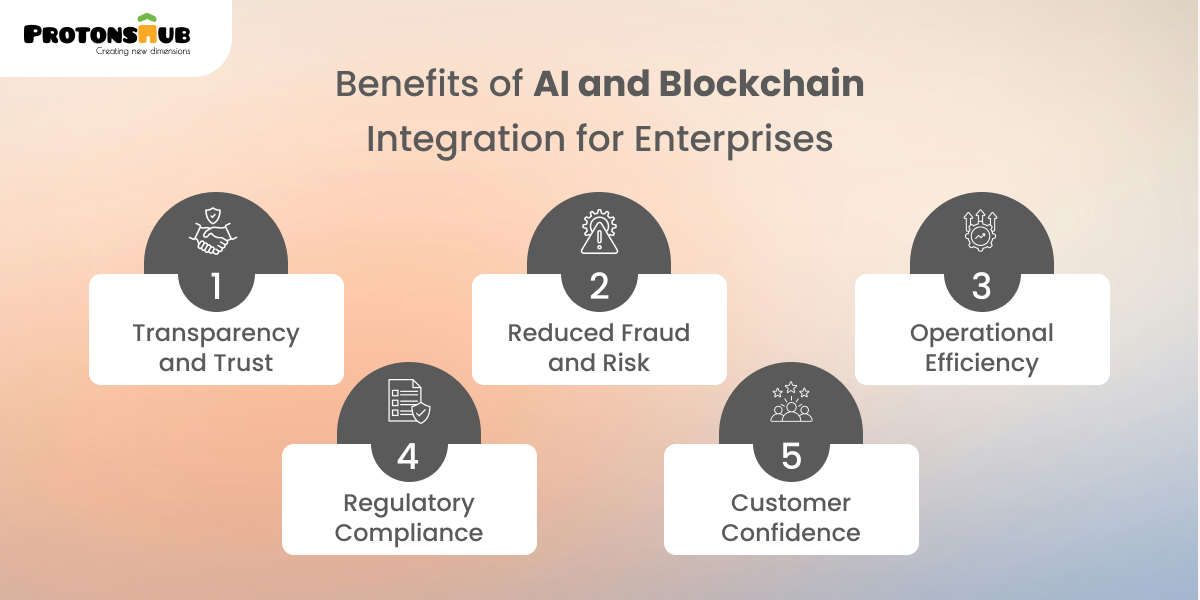
1. Transparency and Trust
Blockchain ensures every transaction or data entry is recorded on an immutable ledger, making it visible to all authorized stakeholders. When AI systems rely on this verified data, their decisions are more accurate and trustworthy. This level of visibility improves collaboration across departments and partner networks, reduces disputes in industries like logistics and real estate, and enhances stakeholder confidence in global operations. For enterprises looking to expand internationally or manage complex partnerships, this combination provides a reliable foundation for sustainable growth.
2.Reduced Fraud and Risk
Fraudulent activities remain one of the biggest threats to enterprises. AI helps by detecting anomalies in large volumes of data far faster than human teams, while blockchain prevents fraudulent data from being altered or injected into the system. Together, they enable banks to identify suspicious financial activity in real time, insurers to reduce false claims, and manufacturers to eliminate risks of counterfeit goods. Enterprises gain stronger defenses, lower financial losses, and increased resilience against internal and external threats.
3.Operational Efficiency
Enterprises are constantly challenged to deliver more value while reducing costs. AI contributes by automating processes such as inventory forecasting, demand planning, and customer support, while blockchain removes redundant verification steps and middlemen from transactions. The result is faster settlements, quicker supply chain movements, and smoother procurement cycles. This dual impact not only reduces operational delays but also frees employees to focus on innovation and strategic tasks rather than administrative burdens.
4. Regulatory Compliance
In industries like finance, healthcare, and government contracting, compliance is both critical and complex. Blockchain provides an auditable record of every action, ensuring that data integrity is never in question. At the same time, AI continuously monitors activities against compliance rules and automatically flags potential violations. This makes audits simpler, lowers the cost of maintaining compliance, and ensures adherence to regulations such as GDPR and HIPAA. Enterprises gain peace of mind knowing that compliance is built directly into their systems rather than managed reactively.
5. Customer Confidence
Customer trust is one of the most valuable assets an enterprise can build, and AI combined with blockchain helps strengthen it.
AI enables personalized customer experiences, while blockchain assures customers that their data, transactions, and interactions remain secure and tamper-proof. In industries like retail, blockchain validates product authenticity, while in digital services, it increases transparency around data usage.
Together, these efforts enhance brand reputation and foster loyalty, helping enterprises differentiate themselves in crowded markets.
Enterprise Challenges in AI and Blockchain
While the integration of AI and blockchain creates significant opportunities, enterprises must also be mindful of the obstacles that come with large-scale adoption. These challenges often determine whether a project succeeds or stalls at the proof-of-concept stage.

1. Integration Costs
Enterprise-scale deployments of AI and blockchain require substantial investment. Building secure blockchain infrastructure, training AI models, and integrating these solutions into existing systems can be both time-intensive and resource-heavy. For many organizations, the upfront costs of technology, cloud infrastructure, and specialized expertise can be a barrier.
However, enterprises that approach this as a long-term strategic investment rather than a short-term expense are more likely to unlock significant returns in efficiency, transparency, and customer trust.
2. Scalability Limitations
While AI models can scale relatively quickly, blockchain networks often face performance challenges when transaction volumes increase. Public blockchains in particular may struggle with slower processing speeds and higher transaction costs, which can be problematic in enterprise environments that demand real-time data processing.
This limitation requires careful consideration of whether to adopt public, private, or hybrid blockchain frameworks and how to optimize them for enterprise use cases. Without careful planning, organizations risk building systems that cannot handle future business demands.
3. Privacy Concerns
Balancing transparency with data privacy is one of the most complex issues when combining AI and blockchain. Blockchain’s immutable nature ensures data cannot be changed, but storing sensitive information permanently can create conflicts with privacy regulations such as GDPR, which require the ability to delete personal data upon request.
At the same time, AI systems often rely on large datasets that may include sensitive information, raising questions about how to grant access without compromising compliance. Enterprises must therefore design solutions where AI has enough data to deliver value while blockchain enforces the right level of security and privacy.
4. Skill Gaps
AI and blockchain are both highly specialized domains, and many enterprises lack the in-house expertise to manage them effectively. This talent shortage often forces companies to depend on external partners for development, integration, and ongoing support, which can increase both costs and reliance on third parties.
With demand for skilled professionals far outpacing supply, enterprises must be strategic about how they source talent—whether by working with an AI outsourcing company for short-term expertise or partnering with an AI development company in India that can offer both affordability and deep technical knowledge at scale.
Strategies to Overcome AI and Blockchain Challenges
Enterprises can successfully navigate the hurdles of AI and blockchain adoption by taking a strategic and phased approach.
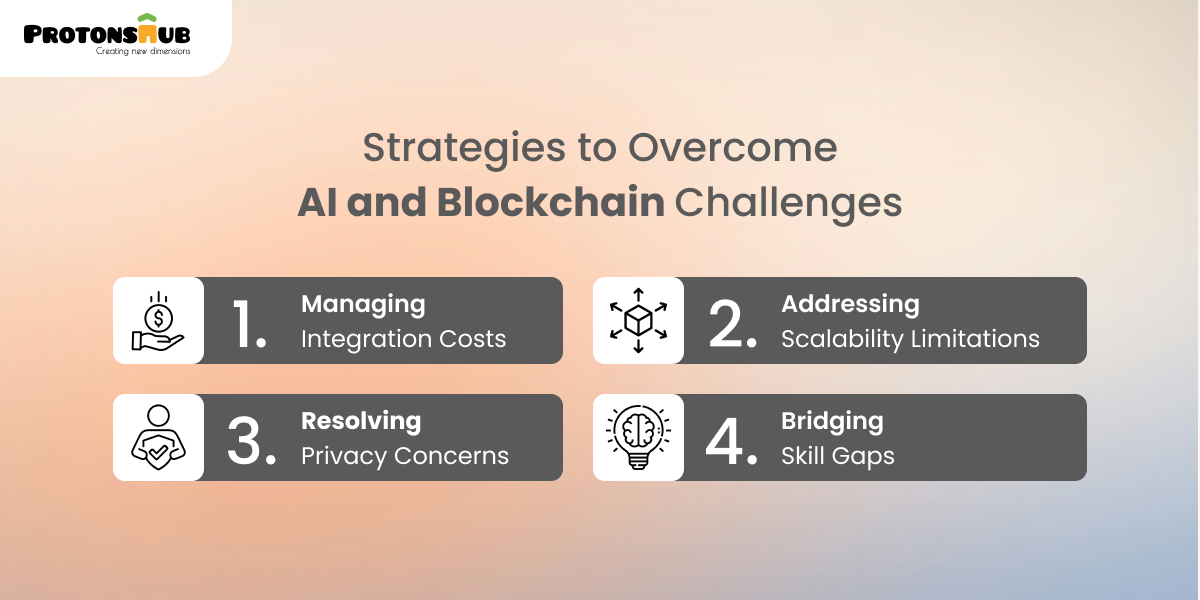
Managing Integration Costs
One effective way to control costs is by starting small with pilot projects that address high-impact use cases before scaling enterprise-wide. Cloud-based platforms and partnerships with an experienced AI development company can also reduce upfront infrastructure expenses and provide access to specialized expertise without heavy investment.
Addressing Scalability Limitations
Scalability issues can be minimized by selecting the right blockchain framework—public, private, or hybrid—based on enterprise needs. Layer-2 scaling solutions, sidechains, and optimized consensus mechanisms can further improve throughput. Enterprises should also integrate AI-driven monitoring tools to predict and prevent network slowdowns as transaction volumes grow.
Resolving Privacy Concerns
To maintain both transparency and privacy, businesses can adopt methods such as zero-knowledge proofs, permissioned blockchain networks, and controlled data sharing. Combining these methods with AI models trained on anonymized datasets ensures compliance with privacy laws like GDPR while still extracting insights from large datasets. Establishing clear governance frameworks around data use further strengthens compliance.
Bridging Skill Gaps
Enterprises can bridge the talent shortage by collaborating with technology partners who specialize in custom artificial intelligence solutions and blockchain integration. Upskilling internal teams through training programs and certifications also helps reduce dependency on external providers over time. Strategic partnerships with universities and research institutions can further create a long-term pipeline of skilled professionals.
The Future of AI and Blockchain in Enterprises
Moving forward, an even stronger integration of these technologies can be anticipated:
- Industry-Specific Solutions: Healthcare, logistics, and finance will see specialized AI + blockchain platforms.
- Autonomous Enterprises: Organizations where AI makes operational decisions and blockchain enforces accountability.
- Integration with Emerging Technologies: The fusion of AI and blockchain with IoT, 5G, and digital twin systems.
- Sustainable Systems: Transparent green supply chains and energy-efficient operations.
The enterprises that start investing today will be best prepared for this transformation.
Conclusion
AI and blockchain are no longer futuristic concepts. They are already driving transformation across industries by making enterprises smarter, safer, and more transparent. From fraud prevention to supply chain visibility, healthcare innovation, and stronger cybersecurity, their impact is both practical and measurable.
Enterprises that invest strategically in these technologies with the support of the right partners can unlock efficiency, resilience, and long-term growth.
If you’re ready to leverage our enterprise AI development services and blockchain expertise, connect with our team today to start building your competitive edge.
